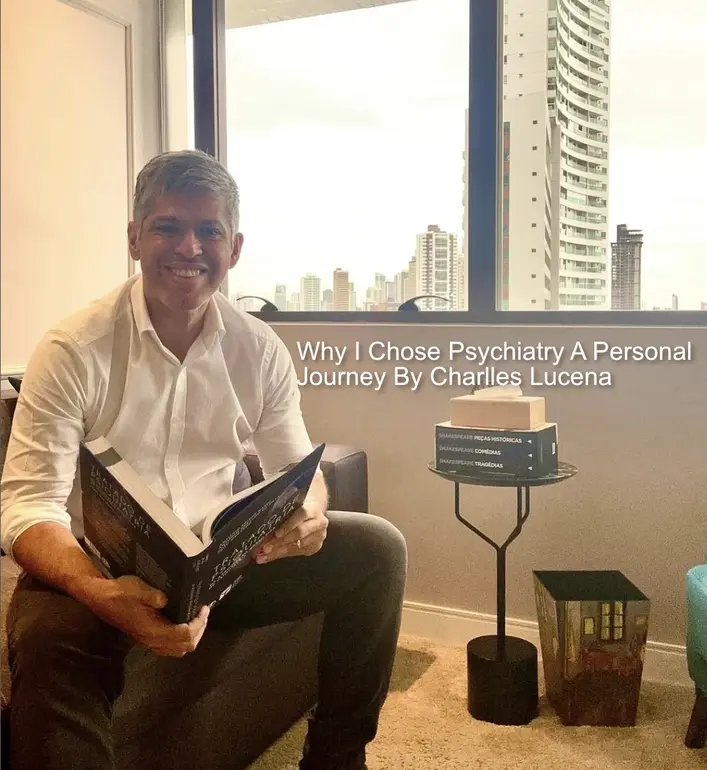Why I Chose Psychiatry: A Personal Journey By Charlles Lucena

Yesterday, I had a conversation with a patient that made me reflect on my journey as a psychiatrist. He asked me why I chose this profession—a field that involves such intense challenges, deeply personal stories, and sometimes, the most difficult of human emotions. He wanted to understand what motivated me to enter a field where I help people facing severe mental health conditions, dealing with their pain and struggles on an intimate level.
At first, it seemed like a simple question, but as I pondered over it,
I realized just how much my path into psychiatry has shaped my life.
The answer is something I’ve often thought about but haven’t always articulated clearly. Let me share that with you now.
Psychiatry Was Not a Difficult Choice

For me, the decision to pursue psychiatry wasn’t hard. It wasn’t just about choosing a profession; it was about choosing a purpose—a purpose that deeply resonates with who I am as a person and as a doctor. I’ve always been drawn to understanding the human mind and the complexities of behavior. But psychiatry, in particular, offered something even more profound. It offered the opportunity to help others by understanding them on a deeper, more intimate level.
In psychiatry, I don’t just treat symptoms or diseases. I connect with people, their histories, their struggles, and their dreams. Every person who walks into my office carries a unique story, and I have the privilege of being part of that story, helping them navigate their path towards healing.
The Challenge and Reward of Psychiatry
Psychiatry is undoubtedly one of the most challenging fields of medicine. It’s a field where the stakes are incredibly high because you’re often working with people who are experiencing some of the most difficult moments of their lives. The work involves not only understanding complex mental health conditions but also providing emotional support, offering coping strategies, and working with patients through their darkest times.
But here’s the thing: challenges are what drive me. They keep me engaged, motivated, and excited every day. Every patient I see presents a new puzzle, a new opportunity for growth—for both them and for me as their doctor. These challenges push me to grow and think in creative ways, often requiring me to approach problems from new angles.
What I love most about psychiatry is that it constantly evolves. There’s always new research, new treatments, and new ways of thinking about mental health. This makes psychiatry an exciting field to be in, where you’re never stagnating, and you’re always learning.
Building Deep, Meaningful Connections
Psychiatry offers a rare opportunity to build deep connections with patients. Unlike many other medical specialties, psychiatry is not just about diagnosing a condition and prescribing a treatment. It’s about building trust, offering a safe space for patients to express themselves, and forming relationships that are rooted in empathy and understanding.
What draws me to psychiatry is the opportunity to really get to know people, to walk alongside them as they navigate the complexities of their mental health. Whether it’s through talking therapies, medications, or a combination of both, psychiatry offers me the chance to be a guide in someone’s life. This deep, personal connection is something I treasure deeply—it’s one of the most rewarding aspects of the job.
The Power of Change
One of the most fulfilling aspects of psychiatry is the ability to help people change their lives. Mental health issues are often deeply ingrained and affect every aspect of a person’s life—from their relationships to their ability to work or engage in daily activities. But the field of psychiatry offers hope.
When I see my patients improving, when they begin to feel more in control of their lives and start rediscovering joy and meaning, it feels like the ultimate success. It’s not always a quick fix, and the journey can be long and difficult, but the transformation is incredible.
Psychiatry Saves Lives
At the heart of it all, psychiatry is about saving lives—quite literally. Depression, anxiety, bipolar disorder, schizophrenia, and other mental health conditions can lead to severe consequences if left untreated. They can affect a person’s ability to function, damage relationships, and in some cases, even lead to suicide. By helping patients understand their conditions, providing the right treatments, and offering support, psychiatry can and does save lives.
This is the medical mission—saving lives by offering hope, support, and solutions to those who feel hopeless. Whether it’s helping someone who is in the depths of depression or someone struggling with a major life transition, psychiatry gives me the chance to make a real difference in people’s lives.
A Profession That Keeps Giving
I didn’t choose psychiatry because I was looking for an easy path or a career filled with accolades. I chose psychiatry because it’s a calling—a profession that demands everything from me, but also gives me the greatest reward. It’s about making a difference, helping others understand their minds, and being there when people need help the most.
Psychiatry is a constant journey—one that requires me to keep learning, to stay compassionate, and to approach each patient with an open mind. I couldn’t imagine being in any other profession.
I look forward to every new patient, every new challenge, and every opportunity to help someone make lasting change in their life. That, to me, is what makes psychiatry not just a job, but a lifelong passion.
If you or someone you know is struggling with mental health, remember that seeking help is the first step towards healing. At LifeStance Health, we’re here to support you on your journey. Contact us today to begin the process of understanding and managing your mental health.
